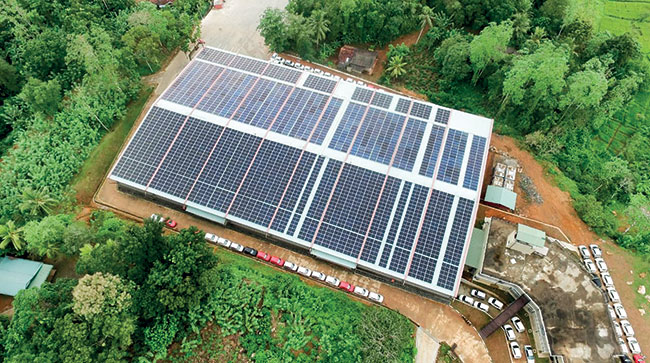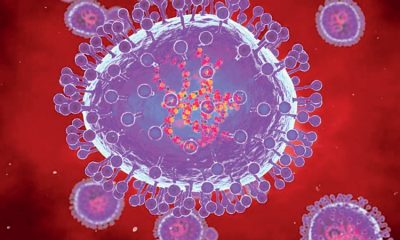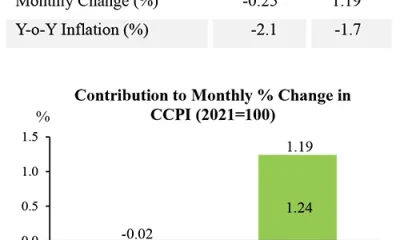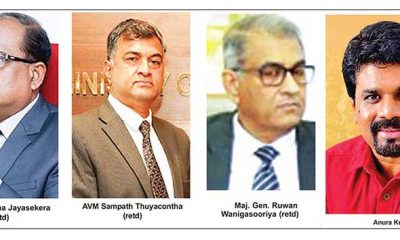Business
Mahindra Ideal Welipenna goes green

Mahindra Ideal Lanka (Pvt) Ltd in Welipenna, a subsidiary of the IDEAL Group was set to add a massive 805 Kilowatt (kW) solar power to the national grid, on 5 September, commemorating Founders Day, the birthday of Nalin Welgama, the company’s Founder and Chairman.
Notably, this groundbreaking event marks the first time-ever that a company engaged in Sri Lanka’s automotive industry will be adding such immense capacity to the national grid and supporting the country’s renewable energy drive.
Contributing to a greener planet and saving the nation’s resources, the Ideal Group’s subsidiaries including Ideal Motors, Ideal Choice and Ideal First Choice have previously established solar power units at its business locations and already benefit from renewable energy and earth-friendly solutions.
Marking significant progress in the use of renewable energy, the following Ideal location has installed solar power and contributes to the national grid;
The Ideal Choice Premium Vehicle Workshop in Ratmalana generates 407 KW with a capital of Rs. 55 Mn.,
 Ideal Holdings, Ratmalana office generates 333 KW solar power having invested Rs. 45 Mn.,
Ideal Holdings, Ratmalana office generates 333 KW solar power having invested Rs. 45 Mn.,
Ideal Motors Main Mahindra workshop at Ratmalana is equipped with a 105 KW from an investment of Rs. 15 Mn.,
The Yakkala Ideal Motors showroom and Ideal First Choice workshop operates through a 102 KW solar system having invested Rs. 14 Mn,
The Ideal Motors and Ideal First Choice Showroom workshop at Puttalam have installed a 43 KW system investing Rs. 6 Mn.,
The Ratmalana Pre Delivery Inspection and Vehicle Yard workshop generates 40 KW through a capital of Rs. 5 Mn., and
The main Ideal showroom in Wellawatte generates 33 KW solar power through an investment of Rs. 5 Mn.
All these installations have been completed by Ideal Greentech (Pvt) Ltd, a subsidiary of the Ideal Group, at a cost of Rs. 260 Mn contributing a monumental over 2 Megawatts to the national grid.
Commenting on its sustainability journey, Nalin Welgama stated, “The whole world is now focusing on renewable energy. As Sri Lanka too embraces the potential of renewable energy sources, we at Ideal Group believe it is our national responsibility to focus and contribute towards this national endeavour. Our showrooms and workshops throughout the island generate and use renewable energy and we are extremely proud of achieving a new milestone at our Mahindra Ideal Lanka plant in Welipenna which is set to generate 805 KW.”
Further elaborating, he noted, “At Ideal, sustainability is a way of life and a key measure of our success. Not even the rainwater collected at this factory is wasted. We have installed a waste water treatment plant ensuring all water used in our bays are cleaned and reused. Additionally, through the practice of adapting dynamic green concepts we have activated the planting of seedlings throughout the factory.”
Celebrating 5th September, the Ideal Group will also mark another momentous milestone for the nation and the automotive industry with the launch of the second phase at its Mahindra Ideal Lanka plant in Welipenna. The foundation stone for the new factory catering to Mahindra Truck assembling will be laid by Mr. Welgama. Upon competition of the factory, which is scheduled for December 2021, the installation of a massive 500 KW solar power system is also slated to take place.
The Mahindra Ideal Lanka plant in Welipeena, Kalutara was commissioned in 2019 through a partnership between India’s diversified global conglomerate Mahindra and Mahindra and the Ideal Group. The state-of-the-art production facility built to global standards assembles the Mahindra KUV 100.
Today, the Mahindra KUV 100 has gained immense popularity in the country and become the preferred choice for customers. The plant is also set to assemble Mahindra trucks in the future demonstrating the strength of local manufacturing capabilities.
“At present, across the the world, due to the spread of the Covid-19 pandemic, including in Sri Lanka we as a country face grave challenges. However, despite the nation in lockdown and our workplaces not fully operating to their normal capacities, the required electricity for consumption is generate through our solar power systems and being supplied to the national grid. As Sri Lankan businessman, I take great pride in this contribution and urge other companies and individuals to play a larger role in solar power generation for the country, supporting our nation’s future.”
Business
“Gem Sri Lanka – 2025” Gem and Jewellery Exhibition Commences under President’s Patronage

The “Gem Sri Lanka – 2025” gem and jewellery exhibition was inaugurated this morning (08) at the Cinnamon Bentota Beach Hotel, by President Anura Kumara Disanayake.
Organized annually by the Chinese Fort Gem and Jewellery Traders Association (CGJTA), the exhibition will be open to the public from today until January 10.
Following the opening, President Disanayake toured the exhibition booths and engaged in discussions with industry stakeholders, addressing challenges faced by gem and jewelry manufacturers while fostering a friendly dialogue with them.
He also posed for a group photograph with the organizing committee of “Gem Sri Lanka – 2025.”
This year’s exhibition features 103 booths and has attracted a significant number of both local and international buyers, highlighting the event’s global appeal.
The event was attended by a distinguished gathering, including the Minister of Industry and Enterprise Development, Sunil Handunnetti, Chairman of the National Gem and Jewellery Authority, Naveen Sooriyarachchi, and Chairman of CGJTA, Marjan Faleel, alongside several diplomats and other notable guests.
[PMD]
Business
‘Unbundling’ of electricity sector to figure in sweeping energy reforms

By Ifham Nizam
In a bold move that promises to reshape Sri Lanka’s energy future, the Ministry of Energy has confirmed the initiation of sweeping reforms to modernize the country’s electricity sector, inclusive of the ‘unbundling’ of the sector into three distinct functions.
Spearheaded by the newly formed Power Sector Reforms Secretariat (PSRS), these reforms aim to create a sustainable, competitive, and people-centric energy landscape, laying the groundwork for a new era in energy generation, transmission and distribution.
At the helm of these reforms is Eng. Pubudu Niroshan Hedigallage, the newly appointed Director General of PSRS. A veteran energy policy expert, Hedigallage previously played a pivotal role in the creation of Sri Lanka’s Energy Policy Framework 2024.
He is joined by a team of renowned professionals, including Prof. Lilantha Samaranayake, Eng. Kosala Kamburadeniya and Dr. Indra Mahakalanda, all of whom bring their expertise and deep understanding of the energy sector to drive this transformative journey.
“We are not merely restructuring the sector,” says Hedigallage. “We are creating an energy ecosystem that serves the people—efficient, transparent, and sustainable. Our goal is to build a system that evolves with the future, while aligning with the immediate needs of the people.”
The PSRS’s reform agenda centers on several key objectives that will revolutionize the sector, with the unbundling of the electricity industry expected to be completed by June 2025.
The reforms’ core feature is the unbundling of the electricity sector into three distinct functions: generation, transmission, and distribution. This segmentation aims to enhance operational efficiency and allow for the creation of a strong single-buyer market, overseen by an Independent System Operator (ISO). While this will foster better competition, critical infrastructure such as transmission and distribution will remain firmly under state control, ensuring public ownership and safeguarding the national interest.
Moreover, the reforms are designed to encourage private sector investment, particularly in renewable energy generation. Eng. Hedigallage notes that the reforms will strike a careful balance—ensuring state ownership of essential infrastructure while opening doors for private innovation in power generation, especially in renewable sources like solar and wind.
Another significant aspect of the reforms is the shift towards empowering consumers to become “prosumers”—active participants who can generate electricity, often through renewable sources and feed it back into the grid. This decentralized approach is expected to reduce dependency on traditional power plants and contribute to a cleaner, more sustainable energy future.
The phased implementation of these reforms will also create the conditions for the eventual establishment of competitive wholesale and retail electricity markets, with the ultimate goal of creating a fully mature, market-driven energy system by 2030.
The PSRS team emphasizes that these reforms are not merely a technical overhaul—they are informed by cutting-edge academic research, data-driven strategies, and long-term planning.
One of the most ambitious goals of the reform agenda is the creation of a democratic and inclusive energy system. The PSRS envisions a future where Sri Lankans are not only consumers of electricity but active participants in its generation and distribution. The transition to renewable energy sources is seen as central to achieving both the country’s energy security and its climate goals.
“Our mission is about more than infrastructure or policy, says Hedigallage. “We are building a future where every citizen can play a role in energy production, consumption, and sustainability. This is an inclusive, fair, and environmentally sustainable energy system.”
The reforms are being rolled out in a phased timeline, with clear milestones set for each stage:
Business
Right of Response to Caritas Sri Lanka

We refer to the published studies by Caritas Sri Lanka titled Research Study on the Culture and Identity of the Plantation Community in Sri Lanka and Right to Education of the Children of the Plantation Community.
At the outset, we express our appreciation to the Catholic Bishops Conference and Caritas Sri Lanka for their interest and recommendations aimed at creating an enabling environment for preserving and promoting the culture and identity of plantation communities. We recognize that the recommendations in these publications encompass a wide range of areas, including inclusive development policies, education and awareness programs, cultural preservation funding, legal protection, economic empowerment, and the promotion of culture-based tourism. While we respect the commitment of Caritas to these communities, we believe the data used in their reports should be revisited to reflect today’s on-the-ground realities. Our goal is to offer updated information so that all stakeholders can align on how best to support plantation communities most effectively today.
In that regard, we note that many of the statistics cited in the report are based on research that dates as far back as 2003/2004, failing to account for the significant progress and developments made in plantation communities since then. As the Planters’ Association of Ceylon, which represents the interests of Regional Plantation Companies (RPCs) in whose estates reside an estimated 42% of Malaiyaha Tamil community, we are compelled to clarify these points and provide a more accurate representation of the current state of these communities. We also acknowledge that further investment and effort is required from all stakeholders, including the Government in order to drive meaningful progress on the several issues. We caution however, that placing the responsibility solely with plantation companies who are only capable of operating within the constraints of employer-employee relationships fails to hold all other stakeholders accountable for their role and capacity to drive broader progress.
Accordingly, we believe It is important at the outset to address the continuous references of this community as Indian-origin Tamils (IOT). While historically, many have referred to this group as Indian-origin Tamils (IOT), today, they are recognized as Sri Lankan citizens with full political and civic rights. As proud Sri Lankans, it’s vital to celebrate the rich diversity within our nation. The Tamil community, with roots in India, is an essential part of our shared heritage. While the term IOT does hold historical and cultural significance, using it exclusively can overshadow the strides this community has made over many generations to achieve these rights, and establish their own identity as Sri Lankans. The term IOT therefore perpetuates an outdated and exclusionary narrative that risks undermining their rightful inclusion within Sri Lankan society. Now commonly referred to as the Malaiyaha community, they are an integral part of the nation’s socio-economic fabric. With a population of approximately 960,000—20% of whom form a vital, actively contributing workforce – which is increasingly transcending the plantation industry.
Education sector challenges
The assertion that education within plantation communities remains chronically underfunded is misleading. With the nationalization of schools, they were incorporated into the mainstream education system. Over time, the education system has undergone significant advancements, supported by consistent government initiatives. This progress underscores the evolution of schooling facilities and the broader education framework, which now aligns with the national mainstream education standards.Since 1977, when the government assumed responsibility for these schools, there has been a steady expansion, and today 863 schools operate within plantation areas.
In parallel, the Regional Plantation Companies (RPCs) with the support of Plantation Human Development Trust (PHDT), have collaborated—often with donor assistance—to establish 1,200 Early Childhood Development Centers (CDCs). These CDCs, staffed by trained professionals, provide not only foundational education for young children but also critical nutritional and developmental support. Through scholarship programs, RPCs have within the means available to them further facilitated opportunities for higher education, with over 100 students from plantation communities entering Government universities each year. With greater support, such positive initiatives could be drastically amplified. While we acknowledge that resource constraints continue to pose challenges, we also wish to give equal and fair emphasis to the tangible gains already achieved. By building on these successes, we aim to ensure that schools serving plantation communities are strengthened, rather than diminished, as Sri Lanka collectively addresses its nationwide education funding needs.
Similarly, health outcomes within RPC-managed plantations have seen vast improvements due to targeted interventions led by RPCs with the support of PHDT. The infant mortality rate, which the publications erroneously state as 60.6%, is now 9.07% under RPC-led estates, aligning closely with national averages. Undernutrition, another cited issue, has also received significant attention, with several targeted programmes having been launched aimed at ensuring comprehensive maternal and child health support to communities within the estates. As a result of these practices, current prevalence of moderate and severe undernutrition stands at 15.57% and 3.9%, respectively, a significant improvement over previous decades.
The studies also portray the housing situation within plantation estates inaccurately. The line rooms, which were historically used for worker accommodation, have been systematically upgraded or replaced under RPC-led initiatives. Over 140,000 housing units have been reroofed, ensuring improved living conditions. In addition, more than 60,000 families now reside in individual/improved housing units with modern facilities. Furthermore, 230,000 individual latrines have been constructed, significantly enhancing sanitation and hygiene within these communities. These ongoing development programs have transformed living conditions, ensuring privacy, sanitation, and dignity for plantation workers and their families. We also note that cultural and identity-related challenges faced by plantation communities are not ignored. RPCs have actively worked to preserve cultural practices while facilitating integration into broader Sri Lankan society. Programs focusing on community engagement, cultural events, and skill development have helped foster a sense of belonging and empowerment. The work carried out by the RPCs with the support of PHDT, trade unions, and government authorities, has been instrumental in driving these advancements. Through this tripartite collaboration, RPCs have achieved measurable progress in improving the quality of life across all facets, including education, healthcare, housing, and economic opportunities.
The Planters’ Association wishes to clarify that the report does not capture the true nature of plantation communities within RPC-managed estates, unfairly painting a negative picture of the entire sector without considering the substantial improvements led by RPCs. This demarcation is necessary to ensure a fair and accurate understanding of the progress made and the ongoing commitment to the welfare of plantation communities.
(The Planters’ Association of Ceylon)
-

 Features7 days ago
Features7 days agoThey, too, had a ball …Down Under
-

 News5 days ago
News5 days agoReshuffle of senior cops on the cards
-

 Editorial6 days ago
Editorial6 days agoBribe-gate and other unsolved plots
-

 Editorial7 days ago
Editorial7 days agoMessages and subtexts
-

 News4 days ago
News4 days agoLanka on alert as deadly HMPV outbreak spreads in China
-

 Business7 days ago
Business7 days agoCCPI-based headline inflation continued to remain in negative territory in December 2024
-

 Editorial5 days ago
Editorial5 days agoSaving children from corporate greed
-

 Midweek Review17 hours ago
Midweek Review17 hours agoUnfolding AKD security strategy











